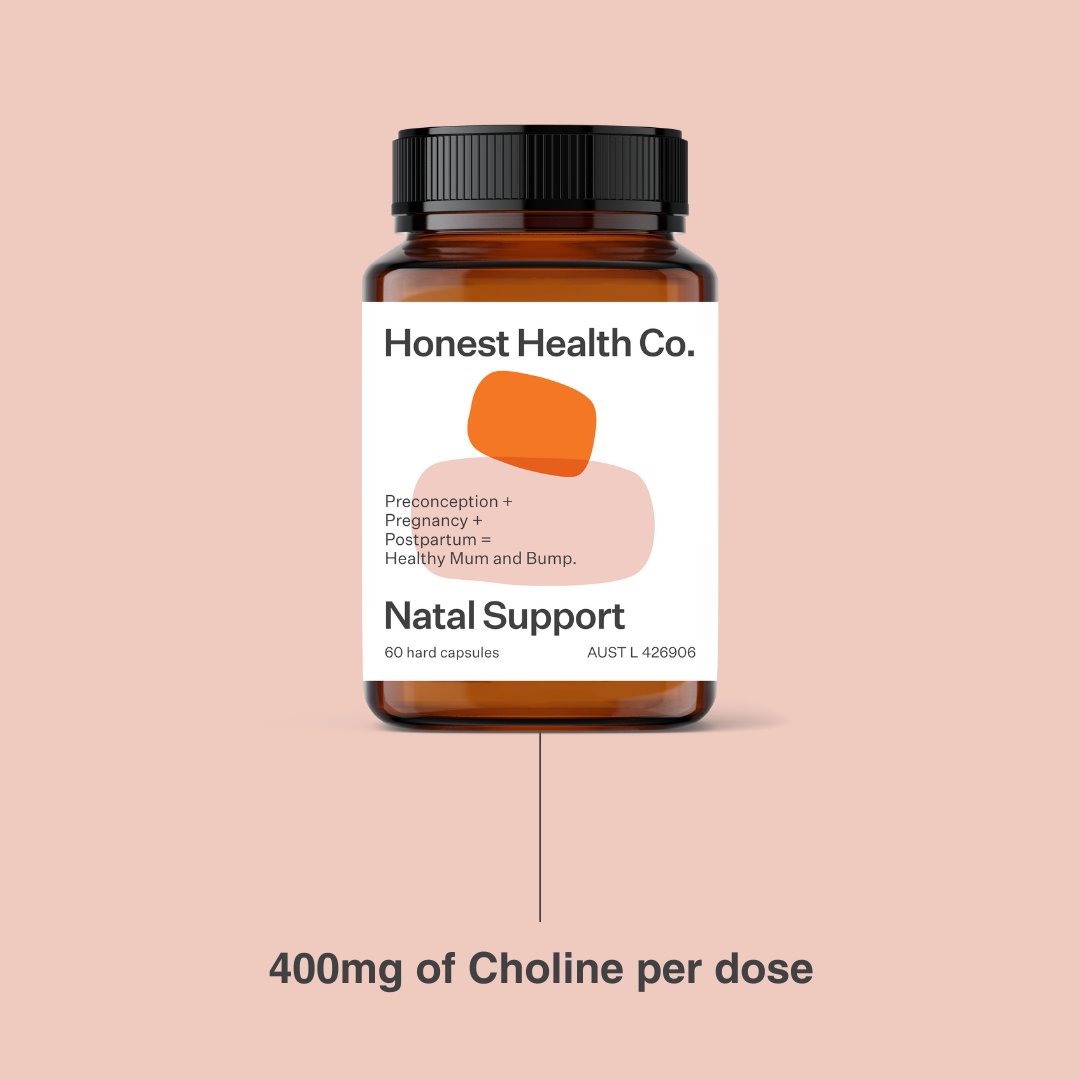Before conception, it's essential to ensure that both partners are getting the right nutrients to support fertility and a healthy pregnancy. A well-balanced diet that includes a variety of fruits, vegetables, whole grains, and lean proteins provides the necessary vitamins and minerals. Consider incorporating Natal Support into your routine to bridge any nutritional gaps and enhance your preconception care plan.
Prenatal supplementation can enhance ovulation, aid conception and improve your pregnancy outcomes.
Dietary Recommendations for fertility
Here are some core aspects of a nourishing, balanced diet that supports fertility.
Whole foods - Consuming a varied diet consisting of fresh whole foods helps to ensure an adequate intake of the nutrients required for the development of healthy eggs. Limiting your intake of processed and packaged foods and increasing seasonal produce (organic, where possible) ensures a blend of vitamins and minerals for fertility.
Antioxidant-rich foods - Including a variety of antioxidant-rich foods in your diet helps to manage oxidative stress and mitigate its detrimental effects on fertility. Beyond general health, antioxidants have been shown to improve a wide range of conception outcomes including egg quality.
Protein - Protein is essential for every cell. It's required for healthy egg and sperm production, for fertilisation and embryo development. The formation of your baby's organs and muscles also depend on protein. Assessing the quality and source of your protein is important during preconception.
Fats - Including all types of dietary fats before and during your pregnancy is important for hormone balance and energy production of the sperm and eggs. It's also vital for the development of the baby's nervous system, brain and cognitive function.
Adequate Hydration - Ensure you are drinking at least 2L - 2.5L of filtered water per day to improve bowel function, circulation and energy. Herbal tea counts towards your intake. If you drink one coffee or black tea, it takes two glasses of water to break even as far as hydration goes.
Specific Tips for Females
Stress - Life and work stress coupled with the stress of trying to conceive can impact your fertility outcomes. Stress can cause hormone imbalances and disrupt normal ovulation. Implementing stress strategies such as gentle movement, mediation, yoga or journaling can be beneficial in reducing your overall stress levels.
Exercise - Exercise can assist you to reach your weight goals, reduce your stress and enhance your stamina for labour. Exercising prior to conception can also help you maintain a healthy weight during pregnancy and after delivery.
Smoking - Smoking not only contributes to long-term health risks for mother and child but is also one of the biggest contributing factors to infertility. Smoking also increases the risk of miscarriage, premature birth and low birth weight.
Alcohol - Excessive consumption of alcohol can reduce your egg numbers and increase the risk of miscarriage and birth defects. It is recommended you reduce or eliminate alcohol during the preconception period, pregnancy and while breastfeeding.
Caffeine - High consumption of caffeine including coffee, tea and energy drinks, can impact your fertility and increase your risk of miscarriage. Limiting your intake to a maximum of 1-2 cups a day is advised.
Recreational Drugs - Recreational drugs can not only be detrimental to your health but also increase the risk of birth defects.
Toxins - Overexposure to environmental toxins can increase our risk of miscarriage and birth defects. While we can't avoid all toxins, reducing your exposure and taking all safety measures can improve your fertility outcomes.
Specific tips for Males
Stress - Regular stress has been found to reduce semen quality. Practising relaxation activities can be beneficial in helping keep you mentally fit.
Diet & Exercise - Nutrients play an important role in male fertility. For example, zinc deficiency can lead to reduced testosterone levels and semen production. Maintaining a healthy body weight is also important in order to produce quality sperm.
Overheating - Overheating can affect semen production. It is recommended you avoid or reduce the use of hot spas & saunas, tight jeans & synthetic materials.
Smoking - Smoking contributes to long-term health risks and is one of the biggest contributing factors to infertility. Research also shows smoking can reduce sperm quantity & quality.
Alcohol - Excessive consumption of alcohol can make it harder to conceive by affecting sperm quality. It is recommended you reduce or eliminate alcohol during the preconception period.
Caffeine - While caffeine can boost your sperm motility, a high intake of including coffee, tea and energy drinks can decrease your fertility due to sperm DNA damage. Limiting your intake to 1-2 cups a day is recommended.
Recreational Drugs - Recreational drugs can not only be detrimental to your health but also have an impact on sperm quality & quantity, in particular, marijuana.
Toxins - Overexposure to environmental toxins can cause DNA damage to sperm. While we can't avoid all toxins, reducing your exposure & taking all safety measures can improve your fertility outcomes.
Frequency of Ejaculation - Ejaculating regularly can help improve sperm health & motility. To enhance conception, it is advised you ejaculate every two days, especially when your partner is ovulating.
Preconception and Pregnancy increases the demand for many nutrients which is why supplementing with a high quality prenatal supplement like Honest Health Co Natal Support is advised as early as possible in the preconception window.





